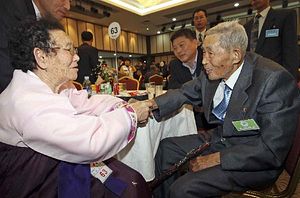South Korea urged the DPRK last week to change its policy and resume the reunions of families separated by the Korean War after a three-year hiatus. South Korean president Park Geun-Hye said that the resumption of the humanitarian program could help promote cooperation between the two Koreas. Many of these relatives have gone six decades without seeing their loved ones. The divided families still cannot write, call, or visit one another.
Park’s proposal called for a new round of reunions to be held during the upcoming lunar New Year on January 31, which is celebrated by both Koreas as a time traditionally reserved for family togetherness.
North Korea, not surprisingly, dismissed Park’s proposal. Pyongyang cited Seoul’s annual joint military exercises with the U.S. and short notice as reasons for its rejection. The Committee for the Peaceful Reunification of Korea was quoted as saying, “How could separated families comfortably meet for a reunion in the face of ceaseless war practices staged in the South?” Nevertheless, Pyongyang said that the talks could resume at a later time if the South was willing to discuss their proposals.
The two Koreas agreed in principle to resume reunion talks last August after Pyongyang concluded several months of bellicose rhetoric and nuclear provocations against Seoul. Yet in September North Korea ordered the indefinite postponement of a series of reunions, saying the South used the dialogue to heighten conflict.
The North does not want to sever ties entirely with its neighbor because it needs outside investment. It appears that Pyongyang is trying to secure more concessions from the South, focused mainly on its tourism industry in Mount Kumgang. The DPRK wants to resume the inter-Korean program at its resort, which proved lucrative for the regime in the past. It was suspended in 2008 when North Korean soldiers killed a South Korean tourist there.
This is largely where the two Koreas diverge on the issue of reunions. While Park sees the family reunion proposal as an issue that should be dealt with separately from Mount Kumgang, and one that could help advance her trustpolitik agenda, the North wants to see the two implemented in unison. Pyongyang wants to develop its failing state-centered economy, including attracting foreign investment, increasing trade, and opening more special economic zones. For Kim Jong-Un’s regime, a desire for economic growth and securing lucrative financial aid is more important than the thousands of families who’ve been forcibly separated. This issue is also an implicit challenge to the North’s leaders because it requires them to somewhat open up their closed-off society. Still, the desire for economic growth could help ease the regime’s repressive rule.
The Koreas held their first family reunions in 1985. Later, on June 15, 2000, during the historic summit in Pyongyang, three series of reunions were established. While these events were inarguably monumental, the number of members of divided families on both sides who have been able to meet each other has been extremely low. There have been roughly 22,000 people who have been able to take part in these reunions since 1985. In the South, there are currently about 73,000 on a waiting list to meet their relatives, around half of whom are more than 80 years old. By some estimates, 4,000 people on the waiting list to reunite with their families die every year. It is estimated that 10 million family members have been divided since the armistice.
Without much fruitful breakthrough in resolving the issue, President Park’s step-by-step policy of building trust and greater engagement with Pyongyang is waning. She has made other conciliatory gestures toward the North, including increasing humanitarian aid and assistance to the country’s farmers and ranchers, but with little success.
Repeated failures to produce any progress on this issue will break the very links that have the potential to tend unhealed wounds as well as sow the seeds for a potentially unified Korea. However, granting the elderly their wish to see their relatives before they pass away can only come to fruition should the North feel it gains sufficient leverage in negotiating with Seoul.
The young who have no memory of a united peninsula are far less enthusiastic about the prospect of unification. It is the older generations, who have strong memories of Korea’s collective past, who are vital in building trust and cooperation on the peninsula.

































